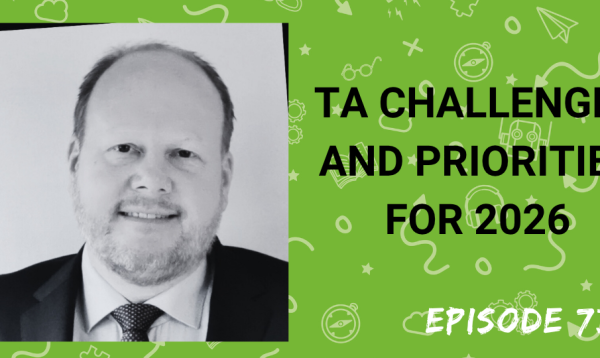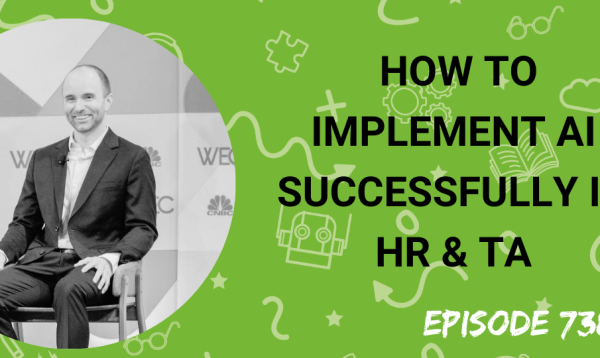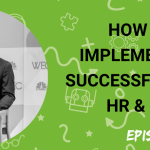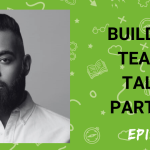We’ve covered the topic of referral hiring a few times on the podcast before; however, it is definitely something to keep revisiting as many employers still aren’t using referral hiring to its full potential.
My guest this week is Dakota Younger, Founder and CEO of referral based hiring solution Boon. In our conversation, we do a deep dive into what makes referral hiring work, its advantages, disadvantages and enormous future potential.
In the interview, we discuss:
- The techniques Dakota used to achieve 84% of hires via referrals in his recruitment business.
- The advantages of referral hiring
- The reasons why many employers are still missing out in this area.
- The vital importance of process and communication
- The role of rewards and bounties
- The balance between humans and technology in today’s referral hiring process
- The negative aspects of referral hiring and how to mitigate them
Dakota also talks about the role of relationships and employer brand as well as sharing his vision for the future of referral hiring.
Subscribe to this podcast in Apple Podcasts
Download my new insights paper on the future of recruiting
Transcript:
Matt Alder [00:00:00]:
Support for this podcast comes from Boon. Boon is a unique platform that’s making referral based hiring effortlessly scalable and infinitely effective. Maximize your recruiting strategy today by visiting goboon.co to learn more and schedule a demo. That’s Goboon co and Boon is spelled B double O N.
Matt Alder [00:00:42]:
Hi everyone, this is Matt Alder. Welcome to episode 195 of the Recruiting Future podcast. Before we start the show this week, I’ve got a couple of announcements. Firstly, I’ve just published an insight paper, the Future of Recruiting, in conjunction with the team at Sabaloo Mess. It’s free to download and gives a pragmatic view of the current state and likely future of employer branding, recruitment, marketing, recruiting automation and the candidate experience. You can find it@bitlymatfuture. That’s bit ly matfuture and that’s all in lowercase and I’ll also put that URL in the show notes. Secondly, next Thursday the 11th of July, I’ll be hosting a unique live edition of the Recruiting Future podcast at Recfest in London. I have three exceptional guests, Megan Butler from Cognition X, Ben Gledhill from Yodle, and Andrew Sohn from Accenture, and we’re going to be discussing recruiting automation. You can find us on the RL100 stage at 10:15 in the morning and it’ll be brilliant to see you all there if you aren’t one of the 3,000 people who already have a ticket. I’m afraid the event sold out. However, I will be publishing the recording of the discussion in a couple of weeks time. So on with this week’s show. We’ve covered the topic of referral hiring a few times on the podcast before. However, it’s definitely something to keep revisiting as many employers still aren’t using referral hiring to its full potential. My guest this week is Dakota Younger, founder and CEO of referral based hiring solution Boon. In our conversation we do a deep dive into what makes referral hiring work. Its advantages, disadvantages and enormous future potential. Enjoy the interview.
Matt Alder [00:02:42]:
Hi Dakota and welcome to the podcast.
Dakota Younger [00:02:45]:
Hi, how’s it going? Thanks a lot. Thanks for having me.
Matt Alder [00:02:47]:
My absolute pleasure. Could you just introduce yourself and tell everyone what you do?
Dakota Younger [00:02:51]:
Yeah. My name is Jody Unger. I’m the founder and CEO of boom. It’s a referral based hiring solution.
Matt Alder [00:02:56]:
Fantastic. So tell us a little bit about your your background story and how you’ve kind of got to be where you are today.
Dakota Younger [00:03:04]:
Yeah, I mean, it’s kind of interesting. So I started initially starting sales, but then got into recruitment. And I. So I started and sold two different boutique recruitment shops. And really early on, one of the things that we recognized that when we found really good talent, they usually knew other really good talent, kind of like this birds of a feather flock together type of mentality. So we were just keen to tap into that. And so we started meddling with a process to get more referrals from the candidates. And then that was effective, but then we started seeing other benefits that we didn’t anticipate that were also really exciting. Like, I think the. Probably the one that stood out to me most was that talent that came from referrals was usually hired twice as fast as talent that we found through job board. So as a recruiter, that meant that we could potentially make, you know, twice as much money in the same period of time. We just kept iterating on this process to get more referrals from the candidates. So by the time I sold the last company, we were getting about 84% of all of our hires from referrals from candidates, rather than having to source them from job boards ourselves. So that was kind of the inception of Boon, or was the inception of Boon. It was really initially just kind of solving our own problem and trying to get more referrals from candidates and then just realizing that. I think the light bulb moment for me was when I learned that for most companies, they’re only getting like 7 to 20% of their hires from referrals. And to me, that just didn’t make any sense for two reasons. I mean, one, if everybody knows this is the best way to hire, why would we not use it more? And how are we getting such better results? So that really kind of sparked my interest there and wanted to kind of dig a little bit further. That’s kind of how how everything got started.
Matt Alder [00:04:45]:
So we can sort of talk about the role of technology in this in a second. But I’m just kind of really kind of interested in sort of exploring that, that, that disconnect a little bit more there. So, I mean, how. What kind of strategies did you put in place to get to that level of referral hiring?
Dakota Younger [00:05:04]:
Yeah, I mean, it comes down to really just figuring out what the problem is first, because like, otherwise you’re just kind of spraying and praying in terms of throwing solutions. So what we started to look at, even from our own initial engagement with candidates, was just Asking them initially, like what, what would work more for you? Or like what would get you to send more referrals? And even there we caught some, some things obviously making the process easier for people. I mean, it seems pretty obvious, but I’d be surprised how long it took us to figure that out. But the easier it was to, the more we would get referrals. So if it was a very straightforward process and wasn’t very convoluted and it was something that could be remembered easily, that was really helpful. Obviously some sort of reward or incentive was, was great. But what we found, what was really interesting to me is there was a point of diminishing returns where the size of the referral bounty was, became less effective if the perceived potential of getting that referral bounty was, was too low. So like, I could offer you a million dollars for something, but if you don’t feel that you’re actually going to receive that million dollars, it does little to no good. Versus if I offer you, let’s say $500, but you really feel that there’s a strong potential of you getting it, you’re like more likely to actually take action on the $500, even though the one is much, obviously significantly higher. So part of that we found was because of communication. Like if they sent a referral and they didn’t hear anything back, they would feel like they were like nobody cared, nobody saw it, and that then they weren’t getting recognized or nobody was even seeing what they were doing. And so then they were less likely to do it again. So it came into really just like making it easier, making it more like transparent and increasing the communication and providing some, some decent incentives for engagement were like, I guess the initial foundations.
Matt Alder [00:07:00]:
I mean that, that, that all makes perfect sense. And it was obviously very successful for you. Why, why do you think a lot of companies are failing to do this? Because like you, I always hear lots of talk of referrals and it being a, a really powerful channel for, for many employers, but it seems like many of them are not using it to the, to its full potential. Why do you think that is?
Dakota Younger [00:07:24]:
Yeah, they’re definitely not like, otherwise Boon wouldn’t really have as much success as it has. And like, I mean, so I think the real, the bottom line is, is the same things that we were discovering on our end is it’s exacerbated within companies. So the talking to of all sides, whether it’s from startups to small, like large enterprises, Fortune 500 companies, the process is rarely straightforward. Like usually it involves like each emailing somebody, the email address is always changing as the staff changes. So people don’t know what it is or that, you know, it’s unclear essentially how to submit a referral. And so it comes through all these channels, a lot of them get lost. So there’s that part of it. I think the engagement is very poor because think about it again. Yes, the reception of them receiving it is low, but also if the only time somebody feels like they’re getting something out of a referral is at the very end, then statistically they’re not actually getting a reward very often, right? If I send like If I send 10 referrals, right, and one of them gets hired, that nine of those times I’m not getting anything out of that, or at least I perceive as the referral provider that I’m not getting anything out of the program. So the majority of the time in that instance, I’m not getting anything out of it. So a lot of the times that’s how it’s set up for companies is the only reward or incentive that is out there is if somebody’s hired. And that’s not a good way to engage people is if it’s only happening very few times out of the majority. So I think the engagement is very low and the engagement structures having a large bounty is helpful, sure. But if again, if the only time somebody’s getting it is at the end and they don’t feel like they’re going to even have a chance of getting it, then it doesn’t really do any good. I think the other piece is the communication and this one is surprisingly critical and also probably one of the most, if not the most common thing we find with companies. And that is like when somebody sends a referral, if they do not know what happens after that referral is sent, if they hear nothing back, they whatever, for whatever reason, human psychology, our default is like the worst case scenario. So they just assumed that nobody saw their referral, that their time was completely wasted and their efforts are completely wasted. And not surprisingly, that’s not a good way to keep people to do stuff. So that’s the case with a lot of companies. Maybe they can send referrals and it’s moderately easy, right? Not easy, but it’s not the most difficult thing. But still when they do send that, there’s no feedback from the recruiters because they’re doing other things. They’re not trying to neglect the referrals, but they have, you know, their main goal is to get these hires. And so the Employees don’t hear anything back. And so it makes the employees feel like, yeah, nobody saw it, so they just stopped sending it. So those are big issues again, the transparency, the engagement and how easy it is to send referrals.
Matt Alder [00:10:25]:
Just digging into the process side of that, do you think that employers should have almost a different recruitment process first stuff that’s come through referrals, or should they just be better at the candidate experience full stop?
Dakota Younger [00:10:40]:
I think that there’s already a. They take a different approach. I mean, that’s one of the benefits of referral hiring is that like, I think that there’s always a. It’s typically a higher priority given to referral hires just because again, most people recognize that it’s. The candidates from, from referrals are more likely to be a stronger fit. You know, not only that, but they’re likely to stay longer. But in terms of like vetting or the interview process, I think that would stay the same. I think most employers already find that the referral hires tend to just have a slightly different process in terms of they’re usually quicker to go through process. The candidates just seem to be a stronger fit for the company culture and for the positions. And again, that’s because the person they’re coming from is, is coming from the environment of the company. Right. They have some of those, those understandings about the ecosystem that, that somebody just applying cold might not understand or be taken into account.
Matt Alder [00:11:38]:
On the back of your success with referral hiring, you’ve started up a technology company. How, how can technology help the referral process?
Dakota Younger [00:11:47]:
I think the technology is hiring in general has a huge potential. But at the flip side, I think that technology is oftentimes credited with too much capability. I mean, I think most recruiters in H, you know, anyone in HR is about sick of hearing how someone, when, when someone says they have a technology, it will completely change and you know, dominate recruitment. Because we’ve heard it so many times and it’s so many times it’s proven to not be the case. And the reason in my opinion, that that’s the case is because that technology is not a silver bullet solution. In fact, in life in general, I have found very few if any silver bullet solutions. It’s usually a patchwork of effective solution on top of effective solution that makes a superior solution. And so the term, I am a huge fan of that. I didn’t come up with this. I found it. It’s called augmented intelligence. So yes, AI and computers are certain things, not at others. And same the flip side so technology is really large amounts of data and serving that up, right? Like that’s what it does best. People are not, right? If I ask you how many people you know that are a good front end developer, you’re at best going to be able to access maybe 10% of your total network, right? Because your brain isn’t designed to work like that. But you’re really good at, and most people are really good at the high touch, kind of like the finer details, right? So using technology to crunch the data and then leverage people for their high touch understandings of things that are less obvious to computers, whether it’s identifying company culture or identifying certain personality traits or capabilities, that’s where I think you’re going to find a much stronger process in general for whether it’s referral, hiring or recruitment in general. So what we do is, that’s the whole point of it is let’s use machine learning, let’s use AI to really scan through somebody’s network, match with an opportunity on Boon or within the company, and then serve the potential matches up to the employee that has those contacts and let them make the final decision as to whether that referral should be sent. Because then they’re not having to read a job description, they’re not having to think of everyone they know, because let’s face it, nobody likes to read job descriptions. And again, you’re not going to be able to access your whole network. Let the machines do that part, right? They’ve read the job descriptions, they scanned it, they’ve scanned through your database of your network and now they’re saying, hey, here are the three people that are a good fit. And then you as an individual are going to look at those people and say, you’re going to know, okay, this person’s not pleasant to work with, right? But that’s not going to be available on the Internet or on their LinkedIn profile. So the, you know, the AI is not going to identify that, but you have, you’ve worked with them, so you’re going to say, no, I’m not going to refer this person because they’re a jerk. Yes, I’m going to refer this other person. They’re really punctual, they’re great. And then I’m also going to refer to another person because they’re a little junior, but I think they’d be a great culture fit. They, they seem to really blend well, they have a hard work ethic, whatever it is. So, but those are good. Rather than having the AI try to send all three of those Right. The AI is letting you make that final touch. So by bringing together what people do best and what technology does best, you end up with a much stronger result as a whole than either of the, of the separate individuals could do on their own.
Matt Alder [00:15:18]:
And what’s your sense about what makes this successful at the human level? Does a successful referral hire come from, you know, is it based on the strength of the relationship with the referrer and the person being referred, or is it the employment brand of the company? What do you think the kind of relationship between those things is?
Dakota Younger [00:15:41]:
I think it’s probably a combination and I think it probably varies on the context. But I think oftentimes the largest piece of success comes from the individual that is sending the referral their knowledge and relationship with the person they’re referring. So not only does that obviously a strong relationship give them better insight in terms of those intangibles, whether it’s, you know, personality, work ethic, all that stuff. But also there’s other benefits to referral hiring. There’s usually a higher retention from candidates that are, that are hired from referrals. And one of the reasons for that that we’ve seen is that when you refer somebody that you know into the company, you’re statistically less likely to leave shortly thereafter because it’s just awkward to bring someone into a company and then bounce shortly thereafter. So again, that relationship is helping to provide that benefit as well. But other companies, I mean, certainly there can be a brand element, but not every company is going to have a really sexy brand or even be well known. But even for younger companies like startups or, you know what, you might not, I wouldn’t say obscure, but maybe not a name brand company. They still have, you’ll see if you look at the benefits, they’re, they’re very similar regardless of what type of company it is, how well known it is. And so that tells me that the common denominator is likely heavily, more heavily weighted towards the relationship between the referral provider and the candidate.
Matt Alder [00:17:16]:
One of the concerns, I suppose, for want of a better word that I, that I hear about referral hiring is its kind of effect on, on diversity within an organization.
Matt Alder [00:17:25]:
What are your, what are your sort.
Matt Alder [00:17:27]:
Of views on that?
Dakota Younger [00:17:27]:
I think if anyone has an idea and a solution that they think is right, that they’re, they’re remiss if they do not take the immediate action. Therefore after should be to try to break it and figure out what’s wrong. Like I always say that, like I think bank robbers do such a poor job is because they always think it’s going to be like this Ocean’s Eleven situation and they just don’t think about. Not that I’m encouraging bank robbering, but I’m just saying they just don’t think about what if this isn’t right? What if we’re not, you know, these things go wrong. And so when you’re applying that to referrals, like what could be the weak points of this? Because if you don’t do that, they’re still going to exist. You’re not. You either can factor them in and try to adjust for them or you’re just going to ignore them and try to pretend that what you have is perfect the way it is. But getting back to your question, like the referrals, if there’s an issue, I think that the incestuous element of it is certainly could be there. I think one of the things that we’ve done to help address that is that with the recommendations that Boon provides, we’re able to recommend people that are a better fit based on their skills and their attributes of their. Whether it’s their skills or background education that fits with the requirements of the position. I think a lot of the times biases are not intentional or malicious, they just happen. Because look, if I ask you again, if I go back to who is the best front end developer, you know, the people that are going to come to mind for you are likely people that you’ve recently engaged with, right? They’re fresher memories if you want to call them, whatever. But those are also likely to be people that are more similar to you. So you’re not intentionally trying to just think of people that are like, like that’s likely not going into your head, like who can I refer? That is just like me. You’re just, it’s just an accident for lack of a better term. So if we can help serve up recommendations for people and allow people to access their fuller network, a larger amount of their network, but also recommend people that are actually qualified for the position, regardless of different biases, whether it’s, you know, race, gender, ethnicity, where they, that like, then you’re going to be able to have a stronger referral overall. There’s always going to be those one offs where someone maybe is being biased. But by and large I think that’s something that we’ve been able to see is a reduced biases because we’re able to provide recommendations that are an actual better fit for the position. And ultimately people want, especially if they’re referring into the organization. They want people that are a strong fit, not only because it looks better on them, it helps the company perform better, but also it’s the reputation that’s on the line. So they don’t want to be referring people that, that make them look bad.
Matt Alder [00:20:08]:
Final question. What do you think the future looks like in this space? If we were talking about referral recruiting in sort of two or three years time, what would we be, what would we be discussing?
Dakota Younger [00:20:21]:
I think that it will become a serious player. And I think the days of thinking of referral hiring as this holy grail that’s not achievable will be something that we look back kind of as a, like a laughing matter. Because the unemployment rate for a lot of companies, especially in the U.S. i mean it’s, it’s essentially for all intents and purposes at zero right now. It’s not necessarily going to always stay that way, but I think it will stay like that for quite a while here in the next ten years at least. And I think companies are going to becoming increasingly desperate to find quality talent. And that forces solutions like referral hiring to really be leveraged more effectively. And so I think in the future it’ll be much more commonplace, if not become maybe the dominant method of hiring is referral hiring just because of the other benefits it provides as well. Right. But that’s I think how the landscape ideally will look if how we’re seeing our growth, even as any kind of tell of what that might look like.
Matt Alder [00:21:25]:
Dakota, thank you very much for talking to me.
Dakota Younger [00:21:28]:
Yeah, absolutely. I really appreciate taking the time.
Matt Alder [00:21:30]:
My thanks to Dakota Younger. You can subscribe to this podcast in Apple Podcasts or via your podcasting app of choice. The show also has its own dedicated app, which you can find by searching for Recruiting Future in your App Store. If you’re a Spotify user, you can also find the show there. You can find all the past episodes@www.rfpodcast.com on that site. You can subscribe to the mailing list and find out more about working with me. Thanks very much for listening. I’ll be back next week and I hope you’ll join me.








